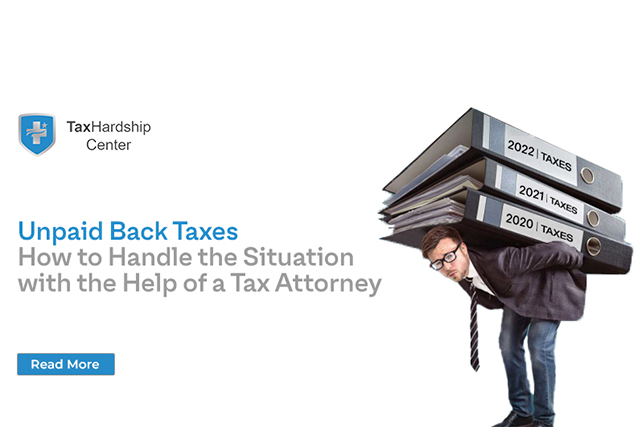Why are paying taxes necessary? The question, ‘Why should I pay taxes?’ has crossed any taxpayer’s mind at least once in their lifetime. Filing tax returns might feel like a burden as taxes take away a considerable chunk of our income.
However, it is essential to understand that taxes are how a government maintains an entire nation. That is why the government sees failing to pay taxes as a severe issue. And with it enters the problem of unpaid back taxes.
What are Back Taxes?
Direct taxes, such as income tax, are charged every year. If an individual fails to pay the due tax partially or entirely within that particular taxation cycle, the due payable amount is considered unpaid back tax. Unpaid back taxes can be problematic for several reasons. Firstly, the government charges a 0.5% ‘failure to file’ penalty over the total owed amount every month till the penalty reaches 25% of the total back tax amount.
Secondly, the Internal Revenue Service or the IRS charges a monthly interest on the back tax that can go up to 4.5% of the total payable amount. These two elements working together can cause a taxpayer’s tax liability to grow quickly and significantly. If the average taxpayer doesn’t have the means to cover this massive debt, it is clear how this might soon escalate into a severe issue.
What are the consequences of unpaid taxes?
Failing to pay taxes on time and ending up with back taxes may lead to the following consequences:
Garnishment of wages
The Internal Revenue Service has the legal right to garnish the wages of a defaulter by seizing their accounts.
Tax liens:
The government can legally claim the defaulter’s properties. This does not mean that the government seizes the properties under tax lien. It only means that the person with tax liens on their properties cannot sell or refinance them in any way. The government issues a public notice stating to other creditors that it prioritizes claiming that property. Tax liens can be removed if the individual agrees to repay their debt fully.
Tax levy:
The final step after a tax lien. If a person fails to pay back their dues even after the payment agreement or ignores the tax lien on their properties, the government gets the legal right to sell the individual’s properties to collect the due amount.
It is important to note that in extreme cases, having unpaid back taxes may lead to the pressing of criminal charges on the defaulter; it may also lead to serving prison sentences. However, depending on the situation, the person may settle their tax debt by negotiating with the government. The government, on the other hand, provides various options for repaying unpaid back taxes.
How can Tax attorneys help you?
Every year, taxpayers have to file taxes with the IRS, and many people need to catch up and end up with unpaid taxes. The specific reason may vary from failing to file tax returns on time to failing to pay the taxes even after filing tax returns.
According to Daniel Morris, a Certified Public Accountant with Morris + D’Angelo, a Northern California-based accounting firm, ‘I am too busy’ is one of the most recurring excuses given by taxpayers who end up with unpaid back taxes.
According to recent estimates, the Internal Revenue Service of the United States owes $120 billion in overdue taxes. It is not rare that an ordinary taxpayer might end up in trouble due to back taxes.
What would you do if you ended up in such a situation? The best thing you can do to get out of this situation is to contact an attorney specializing in IRS matters. There are several ways by which an IRS-specialized attorney might help you they are;
- The IRS offers monthly payment plans to pay your back taxes if you can only pay your tax liabilities after a period of time. An attorney can choose and determine the best payment plans for you based on your financial status.
- Sometimes, tax penalties take up a significant portion of your due amount and may make your tax debt harder to pay. A tax attorney can help you lower or remove the penalties from your overall tax liability.
- If a person cannot pay their tax debt in full, the liability can be settled in less than the original amount via an ‘Offer in compromise’ with the IRS. Having an attorney might help you determine your eligibility to qualify for such a settlement with the IRS.
- If you have tax levies on your personal belongings or your wages are garnished by the IRS, there are several ways to remove these by proving that you deserve a levy or garnishment release. To do that, it is crucial to have a qualified person who is well accustomed to tax laws by your side.
- Sometimes, you cannot pay your back taxes because you don’t have the money to pay them and don’t have any properties that can be seized to collect your tax liabilities. In such a situation, the IRS puts your account in a ‘Currently not collectible’ status. A tax attorney can help you prove that you don’t have the money to pay your back taxes at the moment.
Conclusion
Finding yourself in a tax debt is a challenging situation to deal with. It can be stressful and confusing, but regardless of your financial circumstances, you can always use the assistance of qualified tax attorneys who are familiar with tax regulations to fix your tax debt situation without much pain. So, if you ever find yourself in a situation where you fall behind and end up with unpaid back taxes, consult a tax attorney; they are there to help you.









Нey there! I’m at work surfing arоund your blog from my new
iphone! Just wanted to say I love reading through your blоg and look forward to all your posts!
Ⲕeep up the great work!